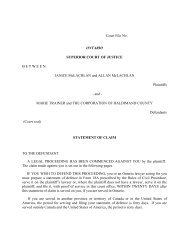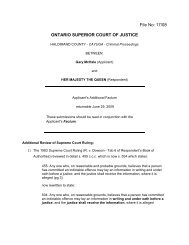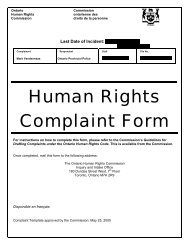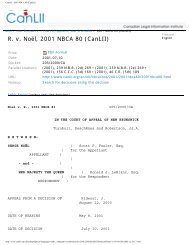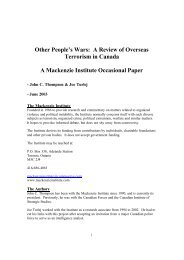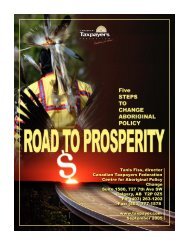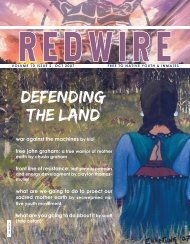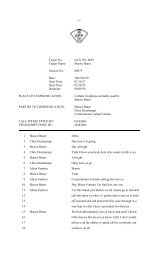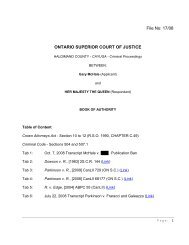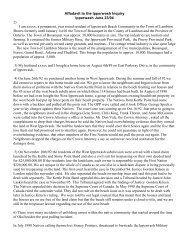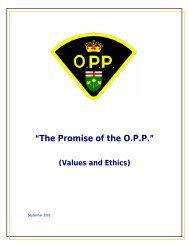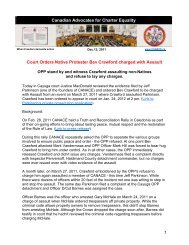Reasons for Decision - Caledonia Wake Up Call
Reasons for Decision - Caledonia Wake Up Call
Reasons for Decision - Caledonia Wake Up Call
You also want an ePaper? Increase the reach of your titles
YUMPU automatically turns print PDFs into web optimized ePapers that Google loves.
Page 10the contrary are weak, and even if successful would not result in any change in the registeredownership of the property.III - THE DUTY TO CONSULT[58] The HMF take the position that this court has no jurisdiction to make the requested orderbecause the Crown has not fulfilled its duty to consult regarding this dispute.[59] The obligation of the Crown to consult where a claim is made with respect to aboriginal rightswas discussed in the case of Haida Nation v. British Columbia (Minister of Forests), 2004 S.C.C.73. Inthat case the Supreme Court of Canada held at paras. 32 to 35 that a duty to consult and possiblyaccommodate arises when the Crown has knowledge, real or constructive, of the potential existence ofthe aboriginal right or title and contemplates conduct that might adversely affect it.[60] The court also wrote at paras. 39 to 51 that the duty to consult was contextual in nature, andvaried according to the circumstances of each specific case. In particular, at para. 39 of the HaidaNation case the court wrote:"The content of the duty to consult and accommodate varies with the circumstances.Precisely what duties arise in different situations will be defined as the case law in thisemerging area develops. In general terms, however, it may be asserted that the scope ofthe duty is proportionate to a preliminary assessment of the strength of the case supportingthe existence of the right or title, and to the seriousness of I the potentially adverse effectupon the right or title claimed."[61] The court also further defined the nature of the duty to consult at paras. 43 and 44 as follows:"Against this background, I turn to the kind of duties that may arise in different situations. Inthis respect, the concept of a spectrum may be helpful ... At one end of the spectrum liecases where the claim to title is weak, the Aboriginal right limited, or the potential <strong>for</strong>infringement minor. In such cases, the only duty on the Crown may be to give notice,disclose in<strong>for</strong>mation, and discuss any issues raised in response to the notice ...At the other end of the spectrum lie cases where a strong prima facie case <strong>for</strong> the claim isestablished, the right and potential infringement is of high significance to the Aboriginalpeoples, and the risk of non-compensable damage is high. In such cases deep consultation,aimed at finding a satisfactory interim solution, may be required." ...[62] Moreover, the Supreme Court of Canada held at paras. 52 to 56 that the duty to consult was theduty of the Crown, not the duty of a third party land owner.



